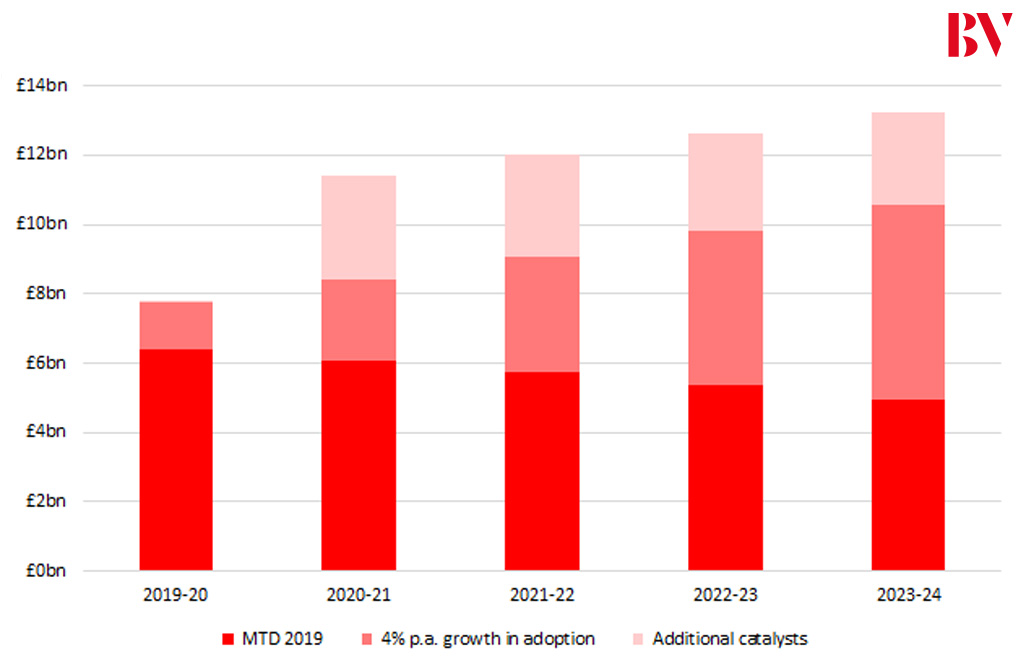A recent report has laid out a digital roadmap that could catalyse up to a £57bn productivity pay-out for UK SMEs over five years
The digitalisation of VAT in April should catalyse an annual benefit of £6.9bn — or £46bn over five years — in net gains in turnover and growth.
The Productivity Payout: UK Small Businesses And The Digital Economy was released by independent economic consultancy Volterra Partners, in association with accounting software solution-providers Intuit QuickBooks.
The new economic model — built on predicted behaviours of small business owners as a result of social and financial drivers — suggests that once businesses integrate technology to become month-to-date (MTD) compliant, a “digital snowball effect” is likely to occur.
The spill-over benefits will drive increases in SMEs’ levels of productivity, by enabling better cash flow and human resource management and freeing time for more productive activities such as sales, marketing or training. Having adopted one form of digital technology, businesses tend to adopt others, saving more time and reaping the rewards from cumulative productivity benefits from digital interoperability.
Despite the gains to be made from the digitalisation of traditional business practices, research reveals that roughly one in five SMEs is still unaware of MTD and its associated impact: a productivity pay-out. For sole traders, the predicted average net gain in annual revenue is £1,900, while a small business with 10-49 employees should see an average increase of £18,000 to their top line growth.
| Increase in turnover (£) |
Average increase in turnover per business (£) |
Average increase in turnover per worker (£) |
|
| With no employees (unregistered) | 0.6bn | 200 | 200 |
| With no employees (registered) | 2.2bn | 1,900 | 1,700 |
| 1 to 9 | 3.9bn | 3,400 | 900 |
| Small | 3.8bn | 18,000 | 900 |
| Medium | 1.4bn | 41,100 | 400 |
| All SMEs | 11.9bn | 4,400 |
Predicted increase in annual turnover (£) if all SMEs experience a catalyst to adopt all digital processes within financial management software. Source: Volterra Partners
Unregistered businesses are not registered with HMRC for VAT or PAYE. Sole traders are registered for VAT but not PAYE.
With no rollout of MTD beyond VAT-registered business, and no further action by government or industry, the model predicts SMEs will see a total productivity gain of £46bn over the next five years. If industry, government and SMEs work together to catalyse further growth of the productivity pay-out is predicted to be significantly higher — £57bn over the same period.

This £57bn hinges on the continued rollout of MTD (beyond the first wave as currently proposed but not finalised), the integration of Open Banking into financial management software, and SMEs collaborating with the software industry on training and support.
Intuit QuickBooks vice-president Chris Evans said it was time for small businesses “to embrace digital with unabated optimism”. The report highlighted a digital-led approach that would transform small businesses, he believes.
“The transition to digital will not be without stumbling blocks,” Evans says, “but it presents a huge opportunity to streamline operations, drive efficiencies and simplify tax. It will enhance cash-flow management, and allow SMEs to get paid faster and access capital.”
The model predicts the largest productivity benefit of digital adoption will be felt by London and England’s south-east. It also predicts that the wholesale and retail trade, construction, professional and manufacturing sectors will see the biggest impact on productivity growth. London has the highest average regional potential benefit per business of £5,700/year.
Manufacturing is the sector with the highest potential benefit per business of £8,100/year, while retail will see almost as much with £7,600/year.
High levels of competition in cities and in the retail sector has driven wider adoption of digitalisation — and higher productivity. A substantial proportion of the productivity increase is derived from time saved, so businesses that are already more productive are able to take greater advantage of that extra time.
“This report sets out a clear and positive view on the benefits that digitisation can bring, not just to self-employed businesses, but to the economy as a whole,” said Andrew Chamberlain, deputy director of policy and external affairs at the Association of Independent Professionals and Self-Employed. But there are challenges too, he warned: “The roll-out … must be carefully handled to ensure businesses can transition to digital systems over a sensible time frame, and with considerable support from both government and industry.”
Michelle Kennedy, co-founder and CEO of the @peanut app said digital tools were “absolutely essential to any business looking to grow and succeed in such turbulent times”.
“Businesses who fail to adopt digital-first thinking risk losing the agility other businesses gain when they are more open to using digital behaviours,” she said. “Without a progressive, tech mindset, companies across the spectrum of industry may significantly hamper their prospects of long-term growth.”






























